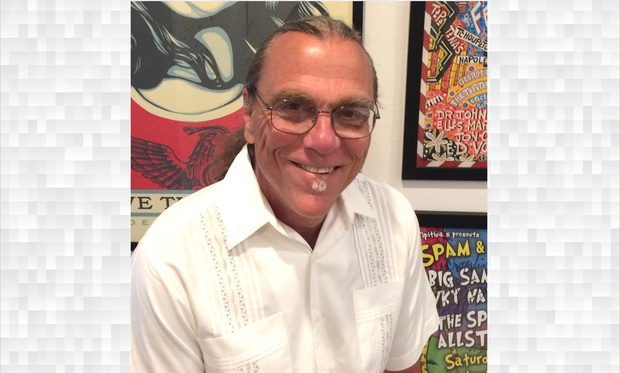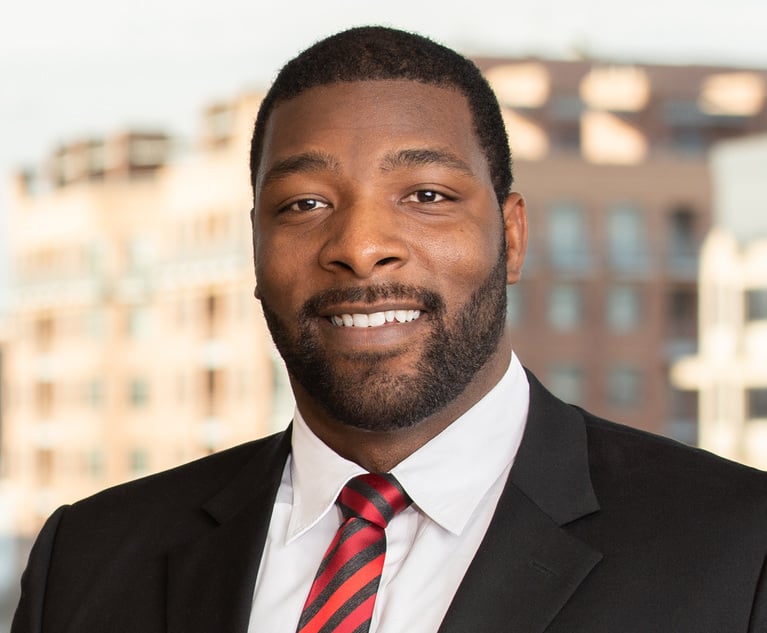San Antonio Appeals Lawyer Closes Firm to Focus on Pro Bono Immigration Appeals
Timothy Patton, a civil appeals lawyer in San Antonio, closed his practice and started a nonprofit to do immigration appeals.
November 02, 2018 at 05:21 PM
6 minute read
 Timothy Patton, attorney and executive director of the Appellate Immigration Project
Timothy Patton, attorney and executive director of the Appellate Immigration Project
Two years ago, San Antonio appellate lawyer Timothy Patton found himself growing more and more frustrated by what he saw happening to people seeking asylum in the United States. He was appalled that people who had lived here for decades were facing deportation. He was horrified that families were being torn apart. So he decided to act.
“I figured I could sit around and complain—or do something,” he said.
Today, Patton devotes his time to pro bono immigration appeals. He recently gave up his for-profit practice, Timothy Patton P.C., having concluded that he needed to spend his time helping asylum-seekers, refugees and longtime U.S. residents appearing before the Board of Immigration Appeals and in federal appeals courts.
He said that lawyers from Texas and elsewhere have flocked to the Texas/Mexico border region to represent asylum-seekers in immigration court, particularly after the Trump administration instituted a policy this year that separated hundreds of children from their parents after they crossed the Texas border. But Patton said there is a large and clear need for lawyers like him to do immigration appeals.
At age 66 and after 37 years of a successful civil appeals practice, Patton said he can afford to give up income and work for free.
“The significance of what he is doing cannot be diminished in any way. It makes me not only proud of him but proud of the legal profession,” said Catherine Stone, an appellate lawyer in San Antonio and a former Texas appeals court judge who has known Patton for many years.
“Tim Patton is an outstanding lawyer and that he has chosen to completely, basically, shut down his … paying practice and devote his time to people who are truly marginalized is so admirable,” said Stone, now a partner at Langley & Banack in San Antonio. “Marginalized people are getting the cream of the crop in terms of the representation they will get on appeal, because he's at the top.”
Over his long career, Patton mostly handled appeals for the clients of plaintiffs attorneys—the last 18 years as a solo practitioner. But he said that, over the last 18 months, he has learned immigration appellate law on a case-by-case basis, using the appellate skills he honed over many years. ”I've been lucky to have found the only area of law which would allow me to do what I like to do,” he said.
Patton added that, when he decided he no longer wanted to do civil appeals, he had “a kind of epiphany” when he realized he could use his skills to represent clients who really need his pro bono representation.
Patton formed a nonprofit, the Appellate Immigration Project, in March 2017. His wife and daughter are directors, and the nonprofit's only paid employee is Patton's longtime paralegal/secretary/proofreader.
In the beginning, Patton said he funded all of the nonprofit's work, but over the last six months, he has received enough contributions—some from lawyers and judges—to support his pro bono work for the next year-and-a-half.
Patton takes client referrals from the BIA Pro Bono Appeals Project, which is run by the Maryland-based Catholic Legal Immigration Network. His clients have come from Mexico, Guatemala, El Salvador, Honduras, the Dominican Republic and the Republic of South Sudan. So far, he has worked on immigration appeals for eight pro bono clients and said he recently took two additional referrals.
The skills Patton polished during his career as an appellate lawyer for the clients of plaintiffs attorneys have proved useful in his immigration work. One recent client, a man from Honduras, sought asylum on the grounds that, like his brother, he would be murdered by the MS-13 gang if forced to return home. A judge awarded him asylum, but the Department of Homeland Security appealed. Patton then stepped in, and the Board of Immigration Appeals agreed with his client, who is now living in the United States.
“It's a pretty good feeling when you win something like that,” Patton said.
Another client, a Sudanese man who had lived legally in the United States for more than 20 years, got into a fight with the boyfriend of an ex-girlfriend and, on the advice of a public defender, pleaded guilty to a criminal charge. Homeland Security used that conviction to seek his deportation, Patton said.
The man appeared in immigration court pro se and convinced a judge that he would be tortured by the government if sent to South Sudan. But the government appealed, and the Board of Immigration Appeals agreed with Homeland Security and ordered him deported. Patton was brought in and filed an appeal before the U.S. Circuit Court of Appeals for the Eighth Circuit. There, the federal prosecutor agreed that the Bureau of Immigration Appeals ruled improperly, and the appeals court remanded the case.
Patton's clients are in detention in various locations, and he communicates with them by phone and in writing. He said he speaks passable Spanish and writes better so can largely communicate with his Spanish-speaking clients.
The BIO Pro Bono Appeals Project has reviewed more than 7,200 appeals cases since it was created in 2001 and distributes appeals to a roster of about 440 lawyers, including Patton. According to the nonprofit, 46 percent of cases handled in the most recent quarter had a positive outcome.
Patton said his decision to do pro bono immigration appeals exclusively is not related to politics. He is a Democrat, but his interest in the area comes from his work on the plaintiffs side.
“I spent my entire career representing individuals, for the most part, and helping them fight fights against people who very often were wealthier and had more funding and support systems,” he said.
For him, immigration cases are always so personal, and the facts are compelling.
“My view on doing appellate work has always been that you win by telling the better story, he said. “And what's enjoyable about this type of work is you always have a good story.”
Further Reading:
Texas Immigration Law Professors Take Action to Help Reunite Families Seeking Asylum
A Week in South Texas Aiding Refugees: Hogan Lovells Sends Team to an ICE Detention Center
This content has been archived. It is available through our partners, LexisNexis® and Bloomberg Law.
To view this content, please continue to their sites.
Not a Lexis Subscriber?
Subscribe Now
Not a Bloomberg Law Subscriber?
Subscribe Now
NOT FOR REPRINT
© 2025 ALM Global, LLC, All Rights Reserved. Request academic re-use from www.copyright.com. All other uses, submit a request to [email protected]. For more information visit Asset & Logo Licensing.
You Might Like
View All
State Bar Ethics Opinion Determines Texas Lawyers Can't Join a Firm With Non-Lawyer Partners
2 minute read
Jones Day Names New Practice Leaders for Antitrust, Business and Tort Litigation and Latin America


Haynes and Boone Expands in New York With 7-Lawyer Seward & Kissel Fund Finance, Securitization Team
3 minute readTrending Stories
- 1Public Interest Calendar of Events
- 2Sharpening Residential Insurance Fraud Defense Strategies: Insights for Insurers to Mitigate Risk in 2025
- 3Reversal of Fortune: Restoring Owners’ Equity Under New Jersey’s Tax Sale Law
- 4Black Judges Discuss Growing Up During Segregation, Efforts to Diversify the Profession
- 5As They Dissolve the Firm, Equity Partners in Houston Trial Firm Hodges & Foty Dispute Over Access to Bank Accounts
Who Got The Work
J. Brugh Lower of Gibbons has entered an appearance for industrial equipment supplier Devco Corporation in a pending trademark infringement lawsuit. The suit, accusing the defendant of selling knock-off Graco products, was filed Dec. 18 in New Jersey District Court by Rivkin Radler on behalf of Graco Inc. and Graco Minnesota. The case, assigned to U.S. District Judge Zahid N. Quraishi, is 3:24-cv-11294, Graco Inc. et al v. Devco Corporation.
Who Got The Work
Rebecca Maller-Stein and Kent A. Yalowitz of Arnold & Porter Kaye Scholer have entered their appearances for Hanaco Venture Capital and its executives, Lior Prosor and David Frankel, in a pending securities lawsuit. The action, filed on Dec. 24 in New York Southern District Court by Zell, Aron & Co. on behalf of Goldeneye Advisors, accuses the defendants of negligently and fraudulently managing the plaintiff's $1 million investment. The case, assigned to U.S. District Judge Vernon S. Broderick, is 1:24-cv-09918, Goldeneye Advisors, LLC v. Hanaco Venture Capital, Ltd. et al.
Who Got The Work
Attorneys from A&O Shearman has stepped in as defense counsel for Toronto-Dominion Bank and other defendants in a pending securities class action. The suit, filed Dec. 11 in New York Southern District Court by Bleichmar Fonti & Auld, accuses the defendants of concealing the bank's 'pervasive' deficiencies in regards to its compliance with the Bank Secrecy Act and the quality of its anti-money laundering controls. The case, assigned to U.S. District Judge Arun Subramanian, is 1:24-cv-09445, Gonzalez v. The Toronto-Dominion Bank et al.
Who Got The Work
Crown Castle International, a Pennsylvania company providing shared communications infrastructure, has turned to Luke D. Wolf of Gordon Rees Scully Mansukhani to fend off a pending breach-of-contract lawsuit. The court action, filed Nov. 25 in Michigan Eastern District Court by Hooper Hathaway PC on behalf of The Town Residences LLC, accuses Crown Castle of failing to transfer approximately $30,000 in utility payments from T-Mobile in breach of a roof-top lease and assignment agreement. The case, assigned to U.S. District Judge Susan K. Declercq, is 2:24-cv-13131, The Town Residences LLC v. T-Mobile US, Inc. et al.
Who Got The Work
Wilfred P. Coronato and Daniel M. Schwartz of McCarter & English have stepped in as defense counsel to Electrolux Home Products Inc. in a pending product liability lawsuit. The court action, filed Nov. 26 in New York Eastern District Court by Poulos Lopiccolo PC and Nagel Rice LLP on behalf of David Stern, alleges that the defendant's refrigerators’ drawers and shelving repeatedly break and fall apart within months after purchase. The case, assigned to U.S. District Judge Joan M. Azrack, is 2:24-cv-08204, Stern v. Electrolux Home Products, Inc.
Featured Firms
Law Offices of Gary Martin Hays & Associates, P.C.
(470) 294-1674
Law Offices of Mark E. Salomone
(857) 444-6468
Smith & Hassler
(713) 739-1250






